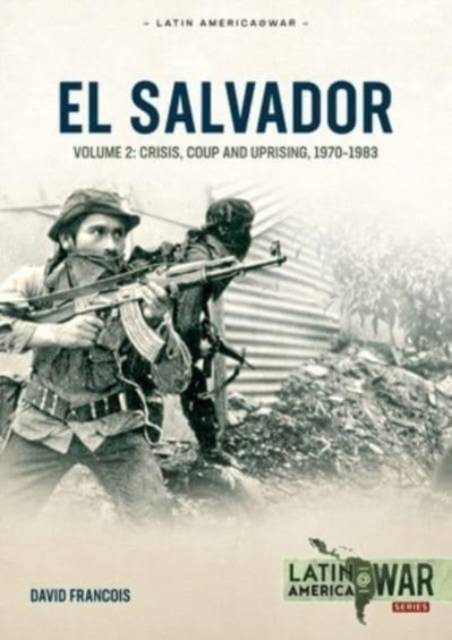
- Retrait gratuit dans votre magasin Club
- 7.000.000 titres dans notre catalogue
- Payer en toute sécurité
- Toujours un magasin près de chez vous
- Retrait gratuit dans votre magasin Club
- 7.000.0000 titres dans notre catalogue
- Payer en toute sécurité
- Toujours un magasin près de chez vous
Description
"Francois does an excellent job offering an entry-level survey of an extraordinarily brutal civil war that lasted for two decades." -- The Journal of the Air Force Historical Foundation
A severe social and political crisis in El Salvador during the 1970s resulted in widespread disturbance of daily life, political violence, repression and the outbreak of an insurgency. In March 1981, the government ran a large sweep operation along the border with Honduras in the north, accompanied by the use of scorched earth tactics and indiscriminate killing of anyone captured. A second offensive, launched in November 1981, was conducted in a similar fashion, and resulted in the massacre of hundreds of civilians by government troops. Under pressure, the insurgency of the Farabundo Marti National Liberation Front (FMLN) called for a peace settlement and the establishment of a government of broad participation. Elections in 1982 were interrupted by a campaign of assassinations by right-wing paramilitaries, which prompted the FMLN to return to arms and hit back with a vicious campaign of attacks on military and economic targets - including Ilopango Air Base, which was heavily hit in February. A new interim government failed to introduce any kind of substantive changes and the armed forces became involved in additional atrocities against human rights activists and union leaders: the result was the next phase of the war that was to last for another two years. In 1984, Christian Democrat José Napoleón Duarte was elected president amid another wave of repression and violence, further reinforced through 1985, despite attempts to reform the armed- and security forces. Nevertheless, by 1986, the notorious 'death squads' were kidnapping and assassinating any opponents they could lay their hands upon. The FMLN thus continued striking back, culminating in the 'final offensive' of 1989, carried out with the aim of unseating a government elected in the obviously fixed elections of the previous year. It was only at that point in time that the government - under severe pressure from the USA - brought the war to an end. After 10 years of merciless fighting that uprooted over one million people and destroyed over 40 percent of homes in El Salvador, the war was over, even though death squads were to assassinate opposition leaders for years afterwards.
El Salvador Volume 2: Conflagration 1984-1992 is the first inclusive and incisive military history of this incredibly vicious, merciless war: one of two major conflicts fought in Central America in the 1980s within the context of the Cold War. Based on official documentation and carefully cross-referenced secondary sources, it is lavishly illustrated with authentic photography and custom-drawn color profiles, and as such is an indispensable single-point source of reference.
A severe social and political crisis in El Salvador during the 1970s resulted in widespread disturbance of daily life, political violence, repression and the outbreak of an insurgency. In March 1981, the government ran a large sweep operation along the border with Honduras in the north, accompanied by the use of scorched earth tactics and indiscriminate killing of anyone captured. A second offensive, launched in November 1981, was conducted in a similar fashion, and resulted in the massacre of hundreds of civilians by government troops. Under pressure, the insurgency of the Farabundo Marti National Liberation Front (FMLN) called for a peace settlement and the establishment of a government of broad participation. Elections in 1982 were interrupted by a campaign of assassinations by right-wing paramilitaries, which prompted the FMLN to return to arms and hit back with a vicious campaign of attacks on military and economic targets - including Ilopango Air Base, which was heavily hit in February. A new interim government failed to introduce any kind of substantive changes and the armed forces became involved in additional atrocities against human rights activists and union leaders: the result was the next phase of the war that was to last for another two years. In 1984, Christian Democrat José Napoleón Duarte was elected president amid another wave of repression and violence, further reinforced through 1985, despite attempts to reform the armed- and security forces. Nevertheless, by 1986, the notorious 'death squads' were kidnapping and assassinating any opponents they could lay their hands upon. The FMLN thus continued striking back, culminating in the 'final offensive' of 1989, carried out with the aim of unseating a government elected in the obviously fixed elections of the previous year. It was only at that point in time that the government - under severe pressure from the USA - brought the war to an end. After 10 years of merciless fighting that uprooted over one million people and destroyed over 40 percent of homes in El Salvador, the war was over, even though death squads were to assassinate opposition leaders for years afterwards.
El Salvador Volume 2: Conflagration 1984-1992 is the first inclusive and incisive military history of this incredibly vicious, merciless war: one of two major conflicts fought in Central America in the 1980s within the context of the Cold War. Based on official documentation and carefully cross-referenced secondary sources, it is lavishly illustrated with authentic photography and custom-drawn color profiles, and as such is an indispensable single-point source of reference.
Spécifications
Parties prenantes
- Auteur(s) :
- Editeur:
Contenu
- Nombre de pages :
- 92
- Langue:
- Anglais
- Collection :
Caractéristiques
- EAN:
- 9781804512180
- Date de parution :
- 30-06-23
- Format:
- Livre broché
- Format numérique:
- Trade paperback (VS)
- Dimensions :
- 206 mm x 296 mm
- Poids :
- 340 g

Les avis
Nous publions uniquement les avis qui respectent les conditions requises. Consultez nos conditions pour les avis.






